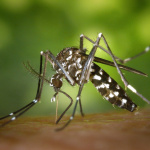Everyone hates to hear the characteristic sound of mosquitoes at bedtime, and everyone tries to protect themselves from this pest in their own way, to avoid bites and itching. But the European mosquito is gradually giving way to its cousin, the tiger mosquito, native to the tropical forests of Southeast Asia, which is far more dangerous, as it can carry numerous diseases. The first case of indigenous dengue fever has been detected in the Paris region.
Usually, the disease is contracted by someone who has recently travelled to an area where the virus is circulating. But this time, in Val-de-Marne, the person concerned had not travelled, and was therefore infected in the Ile-de-France region. According to parasitologist Arezki Izri, speaking to BFM Paris Île-de-France, this is a "natural evolution", which should not particularly worry local residents. If a mosquito bites a dengue-infected person, it will logically go on to infect others.
Fortunately, most cases are asymptomatic, according to Santé Publique France. Be vigilant, however, and seek medical advice if you experience a sudden onset of fever, headaches, aches and pains, nausea or skin rashes. It's going to take some getting used to, as the mosquito season is now likely to be longer and longer, due to higher temperatures in September and October than in the past.
Tiger mosquito in Paris and Ile-de-France: one department on purple alert, the rest on red
The tiger mosquito continues to spread across France. On the map updated by Vigilance Moustiques, we discover that one department in the Île-de-France region has been placed on purple alert, while the 7 other departments in the region remain on red alert. To date, the tiger mosquito has been declared officially established and active in 74 departments in mainland France. [Read more]



 Tiger mosquito in Paris and Ile-de-France: one department on purple alert, the rest on red
Tiger mosquito in Paris and Ile-de-France: one department on purple alert, the rest on red














